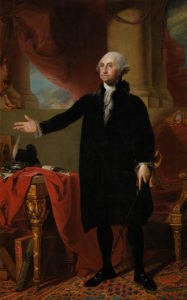What George Washington knew about etiquette
 The concept of etiquette and civility has been around for a very long time. I recently finished a novel called “Rules of Civility” that included mention of George Washington’s Rules of Civility & Decent Behaviour in Company and Conversation. Apparently, at age 16, young George (yes, eventual first president of the United States) copied by hand for a penmanship exercise 110 rules of civility written by French Jesuits in 1590. Those rules were then made into a book by Mr. Washington.
The concept of etiquette and civility has been around for a very long time. I recently finished a novel called “Rules of Civility” that included mention of George Washington’s Rules of Civility & Decent Behaviour in Company and Conversation. Apparently, at age 16, young George (yes, eventual first president of the United States) copied by hand for a penmanship exercise 110 rules of civility written by French Jesuits in 1590. Those rules were then made into a book by Mr. Washington.
Civility certainly seems to be a popular topic lately. I noticed that the April edition of The Oprah Magazine has a feature that includes some etiquette rules from days gone by that still apply today. While the phrasing of the rules may seem dated, the intent still applies.
Here are some of my favorite rules from the George Washington book, original spelling is included.
1st Every action done in Company, ought to be with Some Sign of Respect, to those that are Present. I would say this rule applies even more today with the number of people who are distracted by their digital devices. I see it every day – mom’s focusing on their phones while they out to lunch with their kids; employees checking email during meetings; friends ignoring each other on a get together to look at their phones. George’s advice is good. Give the people in your presence your full attention as a sign of respect.
5th If you Cough, Sneeze, Sigh, or Yawn do it not Loud but Privately, and Speak not in your Yawning, but put Your handkerchief or Hand before your face and turn aside. Yep, I’d say this rule is just as relevant today. Don’t sneeze or cough on others, don’t speak while yawning and use your hand, handkerchief or tissue to shield your face (and protect others) while doing any of these things.
6th Sleep not when others Speak, Sit not when others stand, Speak not when you Should hold your Peace, walk not on when others Stop. The third piece of advice is particularly relevant. My mom always said, “If you don’t have something nice to say don’t say anything.”
38th In visiting the Sick, do not Presently play the Physician if you be not Knowing therein. I think what this means is don’t tell someone who is sick or ailing what they should be doing to get healthy. This is a good reminder for me. I tend to have lots of natural medicine advice that I freely give even when not asked for it. I will refrain and so should you.
49th Wherein your reprove Another be unblameable yourself; for example is more prevalent than Precepts. Another way of saying this is “People who live in glass houses shouldn’t throw stones.” Or, in plain English, if you criticize someone for something, make sure you are not guilty of it yourself. Rather than preach good behavior model it.
65th Speak not injurious Words neither in Jest nor Earnest Scoff at none although they give Occasion. George was basically saying don’t say hurtful things to others either in as a joke or in earnest even if someone seems to deserve it. Be nice is the bottom line.
95th Put not your meat to your Mouth with your Knife in your hand neither Spit forth the Stones of any fruit Pye upon a Dish nor Cast anything under the table. Don’t eat from your knife. If you need to remove something from your mouth such as a cherry pit, piece of gristle or bone take it out of your mouth with cupped fingers and hide it somewhere on your plate if possible. And for goodness sake, don’t throw it under the table.
98th Drink not nor talk with your mouth full neither Gaze about you while you are Drinking. Mom was right, never talk or take a drink from your glass when your mouth is full. And, George also suggests not looking around while you’re drinking.
105th Be not Angry at Table whatever happens & if you have reason to be so, shew it not but on a Cheerfull Countenance especially if there be Strangers for Good Humour makes one Dish of Meat a Feast. This one makes me smile. That clever George. This still applies today – don’t be disagreeable or angry with others at a meal, including the wait staff. But, if you must express your dissatisfaction do it with a cheerful demeanor. I would add, this is true in all situations. Be kind, respectful, cheerful and lighthearted and you will be everyone’s friend.
I also love these rules that are in The Oprah Magazine.
“The art of conversation consists as much in listening politely as in talking agreeably; therefore never interrupt anyone who may be speaking to you, and at the same time do not let your eyes wander to other objects, but keep them on the speaker.”
—Manners of Modern Society by Eliza Cheadle, 1875
“Never boast of your birth, your money, your grand friends, or anything that is yours. If you have traveled, do not introduce that information into your conversation at every opportunity.”
—Routledge’s Manual of Etiquette, 1875
“Instead of spreading out your dresses to exclude strangers from a seat…let us offer the seat cheerfully, and gracefully, and commence a conversation with the new-comer.”
—A Manual of Etiquette with Hints on Politeness and Good Breeding by Daisy Eyebright, 1868
While these rules were written centuries ago they are good reminders for today because, as the article in Oprah’s magazine stated, “…courtesy never goes out of style.”
Which of these rules do you like best? Do you think civility and etiquette still matter?
Please note: We have a new method of delivering blog posts to your inbox. If you have previously received these blog posts through Feedburner, please subscribe to receive these blog posts through the form below and unsubscribe to the posts you receive through Feedburner.

 Sign up for the award-winning Clise Etiquette newsletter and receive a free chapter of Arden's book Spinach in Your Boss's Teeth.
Sign up for the award-winning Clise Etiquette newsletter and receive a free chapter of Arden's book Spinach in Your Boss's Teeth.
Leave a Comment